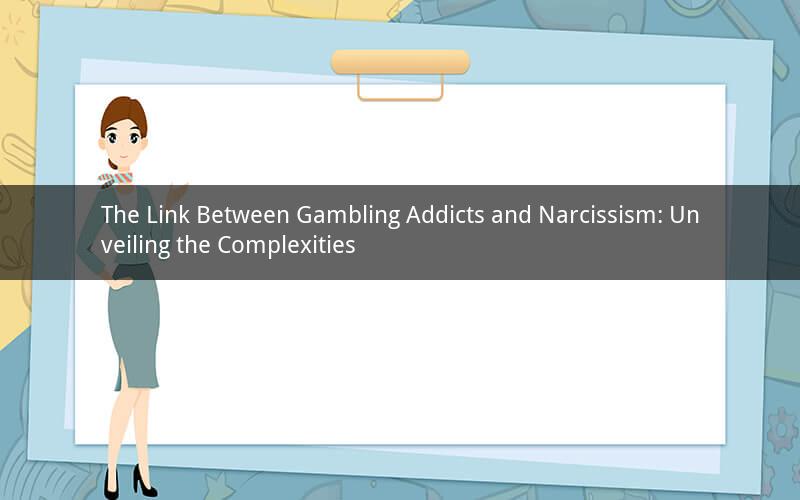
Introduction:
Gambling addiction has been a topic of significant concern in recent years. It is a condition characterized by an uncontrollable urge to gamble, leading to severe financial, social, and psychological consequences. One intriguing aspect of gambling addiction is its association with narcissism. This article explores the relationship between gambling addicts and narcissists, shedding light on the complexities and potential reasons behind this connection.
1. What is Narcissism?
Narcissism is a personality disorder characterized by an inflated sense of self-importance, a deep need for admiration, and a lack of empathy towards others. Narcissistic individuals often display traits such as grandiosity, exploitativeness, and a fragile self-esteem. Understanding narcissism is crucial in comprehending the potential link with gambling addiction.
2. The Connection Between Narcissism and Gambling Addiction
Research indicates that there is a significant association between gambling addiction and narcissistic personality traits. Several factors contribute to this connection:
a. The Need for Validation:
Narcissistic individuals often seek validation and admiration from others. Gambling provides a temporary sense of achievement and recognition, which can fulfill their need for validation. The thrill of winning and the admiration from others reinforce their narcissistic tendencies.
b. Risk-Taking Behavior:
Narcissistic individuals tend to engage in risky behaviors, driven by their desire for excitement and novelty. Gambling offers an opportunity to take risks and experience the adrenaline rush, which aligns with their narcissistic personality traits.
c. Impulsivity:
Gambling addicts often exhibit impulsive behavior, driven by their desire for instant gratification. Narcissistic individuals may also display impulsive tendencies, as they seek immediate validation and recognition, which can lead to excessive gambling.
d. Low Self-Esteem:
Contrary to popular belief, narcissistic individuals may have fragile self-esteem. The constant need for validation and admiration can make them vulnerable to feelings of inadequacy. Gambling provides a temporary boost to their self-esteem, which can perpetuate their addiction.
3. The Impact of Narcissism on Gambling Addiction
The presence of narcissistic traits in gambling addicts can have several implications:
a. Increased Risk of Complications:
Narcissistic individuals may be more prone to experiencing severe consequences of gambling addiction, such as financial ruin, relationship breakdowns, and legal issues. Their need for validation and admiration can exacerbate these complications.
b. Treatment Challenges:
The narcissistic tendencies of gambling addicts can pose challenges in treatment. They may be resistant to seeking help, as they may view their addiction as a reflection of their superiority. Therapy approaches that address both addiction and narcissistic traits may be more effective.
c. Relapse Risk:
Gambling addicts with narcissistic traits may be at a higher risk of relapse. Their fragile self-esteem and the need for validation can lead them to return to gambling as a means to regain their self-worth.
4. Addressing the Link Between Narcissism and Gambling Addiction
To effectively address the link between narcissism and gambling addiction, a comprehensive approach is required:
a. Therapy:
Cognitive-behavioral therapy (CBT) can be beneficial in treating both addiction and narcissistic traits. CBT helps individuals develop healthier coping mechanisms, challenge their beliefs, and improve self-esteem.
b. Support Groups:
Support groups provide a platform for individuals to share their experiences, seek support, and connect with others who have faced similar challenges. Narcissistic individuals may find value in these groups as they can receive validation and support without the need for admiration.
c. Financial Counseling:
Gambling addicts often face significant financial consequences. Financial counseling can help them regain control over their finances, develop budgeting skills, and address the root causes of their addiction.
5. Frequently Asked Questions:
Q1: Can all gambling addicts be considered narcissists?
A1: No, not all gambling addicts exhibit narcissistic traits. However, there is a significant association between the two conditions, indicating that narcissism can be a contributing factor in certain cases.
Q2: Can narcissistic individuals develop gambling addiction?
A2: Yes, narcissistic individuals can develop gambling addiction. The need for validation, impulsivity, and the thrill of gambling can contribute to the development of an addiction.
Q3: How can someone identify if they have a gambling addiction?
A3: Identifying a gambling addiction involves recognizing symptoms such as preoccupation with gambling, neglecting responsibilities, increasing the amount of money and time spent on gambling, and experiencing negative consequences as a result of gambling.
Q4: Can therapy help both addiction and narcissistic traits?
A4: Yes, therapy can address both addiction and narcissistic traits. Therapists specializing in addiction and personality disorders can develop personalized treatment plans to address both aspects effectively.
Q5: Is it possible to overcome gambling addiction and narcissism simultaneously?
A5: Yes, it is possible to overcome both gambling addiction and narcissism simultaneously. A comprehensive approach that includes therapy, support groups, and financial counseling can help individuals achieve lasting recovery.